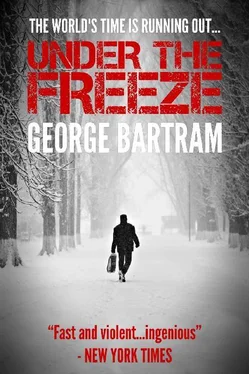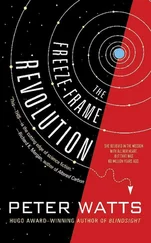And as he dove into the darkness he saw a figure on the platform where Repin had stepped aboard the patrol boat, and it registered: Scuba diver ; man in scuba gear on the ladder ; and he was leaping into darkness.
On the deck of the patrol boat there were voices, alien, faraway, the Spanish like a language he had never heard before. “Cast off! In the name of Christ, cast off!” And there was movement on the ladder where the scuba diver was.
He twisted through the air and landed on his right foot, but off-balance. He tried to turn his body back toward the hatch, but his momentum carried him toward the stem, almost over the transom, and he stumbled over something yielding and heavy and went down, his right arm and the shotgun turned under him, and his head ducked as if he were going to do a somersault; then his back came up against the transom with a concussion that almost knocked the wind out of him. Yet he got his legs down and slithered forward until his shoulder met the yielding mass he had fallen over, and then, hurting in his back and his shoulder, he had the shotgun up and ready to fire.
There was no light at all now except for the flashlight that had fallen on the deck and that had rolled almost over into the scuppers on the port side as the boat rolled. The patrol boat had put out its own lights; men were shouting and the engines were roaring and the black bulk of the patrol boat began to slide away as if it were sinking, but it was only moving a few yards away from him to get running room, and then the engines rose to a higher pitch and suddenly it was gone, and he was aware of a void to his left where it had been.
And, with the engine sound going away, he could hear now the quick, disturbing sound of a dying man’s breathing. The breath came in little sighs, little whines of despair with a groan at the end of each one. The deck under his left elbow was greasy with blood and the man’s breath came like the panting of a dog that has been out running.
He fired one shot toward the open hatch, and a string of shots came back at him. The dying man was pushed up against him as if he were cuddling up for warmth, the force of the bullets pounding the breath out of him so that there was no more panting, but only a long, dignified, quiet gurgle as he gave it up. Tarp fired another shot at the muzzle flash and waited until the rolling light stuck its finger into the open hatch and showed him the top of a head when he fired again; the light rolled on, but not before he saw movement, and he pumped and fired.
The patrol boat was going away at flank speed. Tarp was still watching the hatch, which he could almost see as his eyes adjusted; as he waited, part of his mind was thinking, sorting it out, and telling him, There were two operations laid on here ; one was Repin’s with the Cuban navy and one was something else that Repin didn’t know about , and now the navy’s getting out because their part is over and they want to stay clean .
From the hatch, a voice said, “Oh, Jesu, help me,” and Tarp fired another shot at it and waited. The dropped flashlight rolled back the other way and showed the hatch empty. Tarp counted twenty and moved to the dead man’s feet, from where he could reach far over to his left and grab the flashlight and shine it where he wanted. In that dead light, the hatchway looked as if it had been attacked by crazed carpenters.
Tarp got up on one knee. From there he could see the top of the man’s head. By stretching, he could see part of his back. The man was very still. A machine pistol was gripped in one hand, the arm twisted under him on the stair.
Tarp got up and went closer and saw that the man was dead. He forced the body down the ladder with his feet, sitting on the deck and pushing with both feet, and it went slowly down with the unwilling heaviness of dead weight.
Tarp started the engine and put the boat on a course that would take it westward, parallel to the coast and into the Caribbean. Heading straight for Florida would be stupid.
He was shaking a little. He sat at the controls and held on to the wheel and waited to run down. When he felt better, he lifted his left pant leg and shone the flashlight on it. An inch-long piece of wood from the flying bridge was stuck into the muscle like a spear. He found pliers and pulled it out and let it bleed.
He looked over the two dead men. Both carried machine pistols and diver’s knives. Their flashlights were identical rubber-coated, heavy-duty marine lights. They wore identical dark T-shirts and dark cotton pants with cargo pockets, dark-brown canvas shoes.
He turned over the man on the deck. He was young, dark; he had grown a brave little mustache. Tarp pulled up what was left of the T-shirt and searched the abdomen, then opened the pants and pulled them down. There was a plastic-covered card taped below the man’s navel. Tarp pulled it loose. It had been laminated; it was dark green, with a legend in black letters and a thumbprint but no photograph.
A get - out - of - jail - free card . There was one just like it on the other man. Other than the cards, there was no identification, no wallets, no keys. Nothing.
DGI , he thought. Dirección General de Inteligencia . The Cuban KGB.
Tarp squatted on the deck and scowled at the moonless sky.
It made no sense.
He knew what had happened well enough: somebody had busted Repin’s deal with the Cuban navy captain and the DGI men had been put aboard to deal, not with Repin, but with the man who had brought Repin back. The navy captain had divorced himself from all that as quickly as he could, so that, if there were repercussions later, he could claim to have done his duty both to Cuba and to Repin. And the DGI men had come aboard Tarp’s boat to capture or kill him. But if they failed, then Tarp would go free.
That made no sense.
Tarp thought of the figure in scuba gear whom he had glimpsed on the patrol boat’s ladder.
They planted a bomb on me , he thought. He wrapped his arms tighter around his knees and stared at the darkness. He knew it now as surely as he knew that he had killed two men. It would have taken only minutes for the diver to plant a limpet mine under the sportfisherman’s hull. Then the DGI men would have killed him or captured him and they would have left the boat to drift and then blow up. There would have been no loose ends that way.
Tarp felt as if a gentle wind were blowing over his scalp. He was sitting on a bomb whose timer was running.
There was an inflatable forward of the cabin, and he raced to make it ready. Even with the help of the two flashlights, it took him valuable minutes to loosen it and get it into the water and pull the inflation lanyards. There was a small British outboard in clamps next to where it had been stowed, and he loosened those and screwed the little one-lung engine to the wooden transom with impatient movements.
He grabbed the .22 from its hiding place and climbed into the dinghy. The jointed oars seemed useless for moving the stubborn hull, which rose on a slight swell and seemed to go nowhere. Tarp pulled harder, waiting for the limpet mine to blow, imagining the inflatable lifting suddenly on the explosion and the fabric tearing, the floor erupting under him, ripping him apart, striking his legs and spine and genitals with the force of a runaway truck. He pulled as hard as he could. The inflatable coasted down the swell; when it rose again, the sportfisherman was fifty feet away. He rowed for ten minutes, when the fishing boat was a small silhouette against the pale light above the Cuban coast, and then he rested, his breath rasping, his arms weak.
Читать дальше












